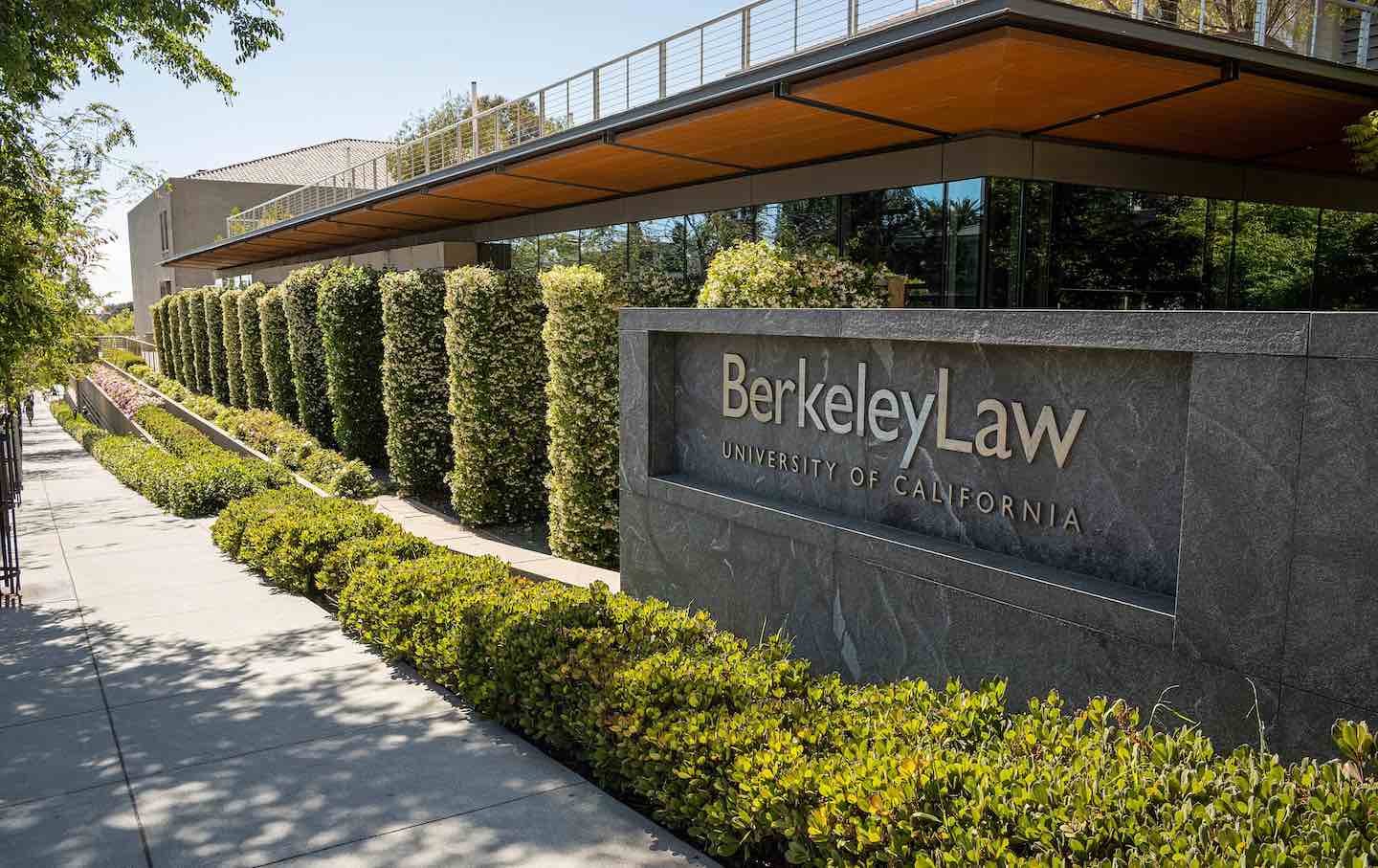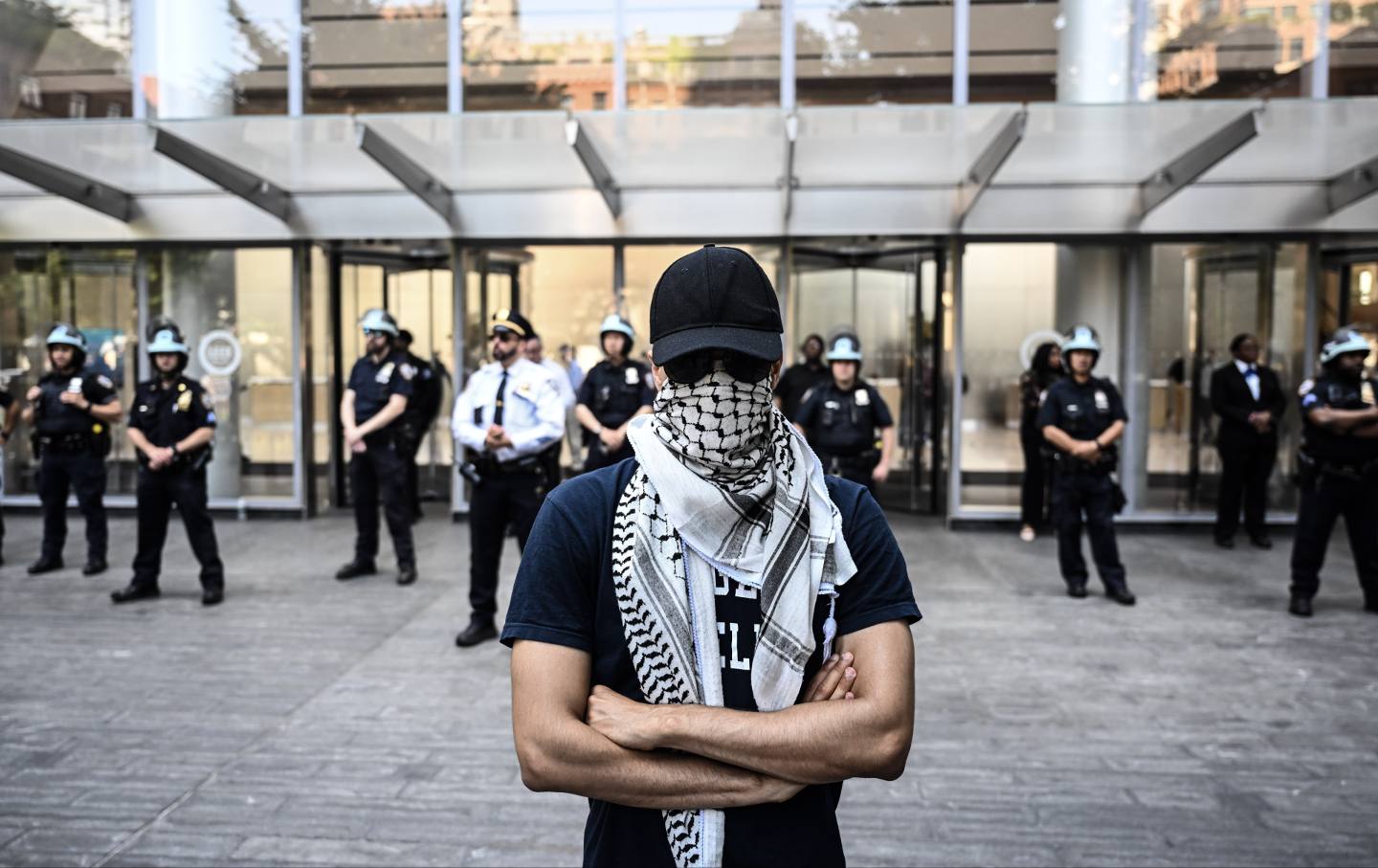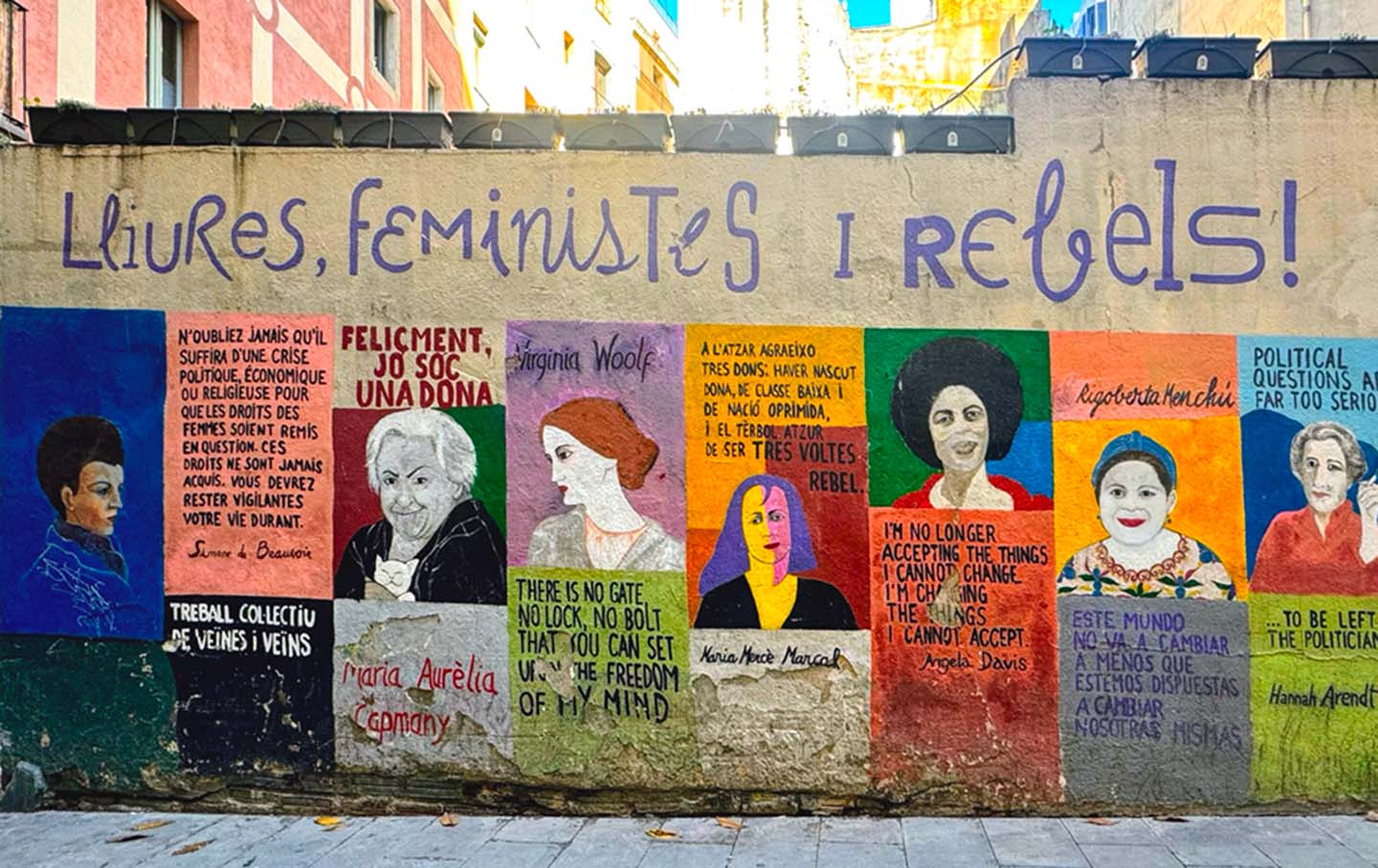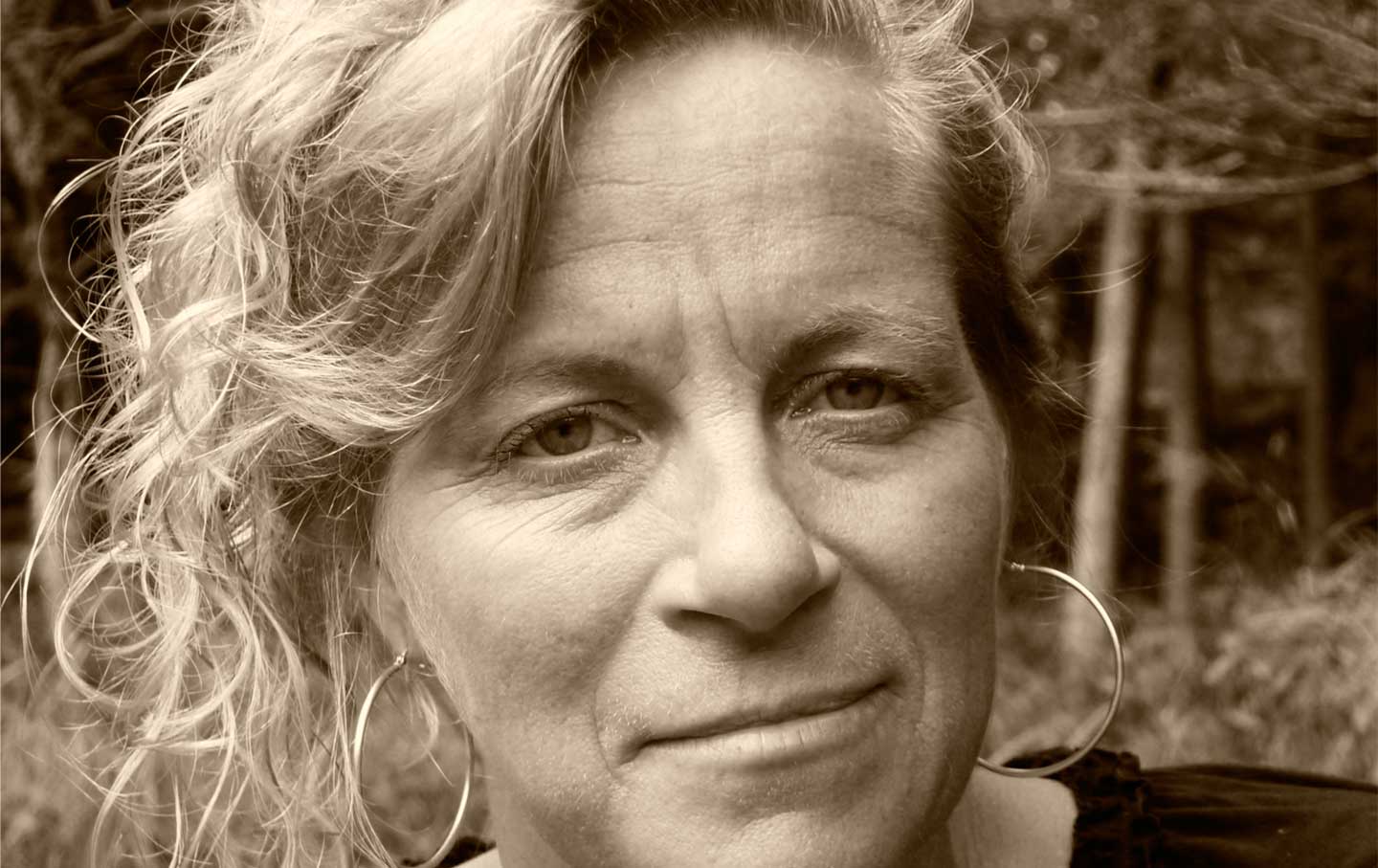A Protest in Berkeley Escalated Into Antisemitism
Students have every right to protest Israel’s actions in Gaza. But doing so at the home of a Jewish professor crosses a line.

The Berkeley School of Law on the University of California, Berkeley, campus.
(David Paul Morris / Bloomberg)University of California, Berkeley, Law School Dean Erwin Chemerinsky has a storied record as a constitutional law scholar and an attorney willing to take on some of the hardest and most unpopular causes. In January 2002, he filed the first lawsuit on behalf of Guantánamo detainees, just days after the detention center opened. A few years later, he represented the family of Rachel Corrie—the young American woman who joined the International Solidarity Movement in support of Palestinian rights and was killed by Israeli Defense Forces in the Gaza Strip in 2003, shortly before her 24th birthday—in their lawsuit against Caterpillar, whose equipment was being used to demolish Palestinians’ houses in the Occupied Territories.
I first met Chemerinsky six or seven years ago, when we were both writing weekly columns for The Sacramento Bee on the Trump administration and its escalating assaults on the rule of law. We were also both, as a result of our writings, receiving death threats and other hate mail, on a fairly regular basis, from outraged denizens of the MAGA movement.
Recently, however, Chemerinsky and his wife, Catherine Fisk, also a UC Berkeley law professor, have become the target of an extraordinarily vitriolic and antisemitic campaign from some pro-Palestinian activists on campus and at the law school. Their offense? Not that Chemerinsky is pro-Netanyahu or that he’s spoken out in defense of the IDF’s actions on Gaza—he isn’t and he hasn’t, and in fact he told me this week that he abhors what Israel is doing in Gaza and opposes the blockade of food into the territory. But he has made statements in the past saying that he supports Israel’s right to exist. Activists have also called him out for not signing on to a Boycott, Divestment, and Sanctions demand, even though this is entirely outside his bailiwick: As dean of the law school, he has zero institutional say as to whether UC Berkeley, or the UC system more generally, divests from Israel.
Chemerinsky and Fisk have long opened up their home and their garden to host law school students at an annual dinner. This year, because the university was still playing catch-up after the pandemic years made such gatherings impossible, they agreed to host three dinners in quick succession for multiple years of students.
In early April, as the dinners were nearing, activists with a group called Berkeley Law for Palestine put up posters at the law school that showed a vicious caricature of Chemerinsky holding up a bloodied knife and fork. Chemerinsky also interpreted the image as showing his lips limned with blood. The caption, all caps, read, “NO DINNER WITH ZIONIST CHEM WHILE GAZA STARVES!” It would not have been out of place in Der Stürmer during the heyday of the Third Reich.
Chemerinsky has made a conscious effort to not make public statements on Israel and Gaza over the past six months, preferring, he told me, to focus instead on his areas of specialty, which mainly concern US constitutional law. Given this, it’s hard not to come to the conclusion that he was targeted with this ancient blood-libel imagery not because of his position on Israel, which he has kept largely private, but because he happened to be the highest-profile Jew in the neighborhood.
Days later, the activists disrupted the dinner by bringing in their own microphone and amplifier, and attempting to seize control of the gathering. When Chemerinsky, who is in his 70s, asked them to stop, to respect the fact that they were guests in his house, and to leave if they weren’t willing to join the dinner, they refused. When Fisk tried to grab the microphone away from the woman who was speaking, the student refused to cede the microphone. As the two women tussled for control, Chemerinsky continued to plead for the protesters to desist.
Finally, the group of 10 or so students left—but not before accusing Fisk of assault. Subsequently, they have called for the university to fire both Chemerinsky and Fisk and demanded that the police open an investigation. In the days since the events, each has been bombarded with grotesque hate mail. Fisk, Chemerinsky told me, has received messages like “you should die, fucking cunt.” Protesters have surrounded their house, banging drums and trying to disrupt their gatherings.
Anti-war protest is an American tradition, and Israel’s actions in Gaza, in the six months following Hamas’s murderous assault on October 7, are so brutal, the civilian death toll and the destruction of infrastructure so unrelenting, the food blockade so cruel, that they certainly deserve strong condemnation. But I fail to see how any of the events in Berkeley do one iota of good for Palestinians. I can’t for the life of me see how lobbing toxic, antisemitic messages and cartoons the way of a celebrated, and progressive, legal scholar advances the cause of the left or focuses attention on the awful acts carried out by the IDF in Gaza.
If this sort of action is deemed legitimate by progressives simply by virtue of the fact that Chemerinsky is Jewish and believes in the legitimacy of the state of Israel, then they are quite simply jumping the shark into the raw antisemitism of past mobs whipped up into an anti-Jewish furor in Tsarist Russia or Nazi Germany.
Chemerinsky’s worldview—his belief in Israel’s right to exist combined with a long history of respect for human rights and his disapproval of hard-right Israeli government policies and the behavior of settlers in the Occupied Territories—is similar to that of say, Albert Einstein or Isaiah Berlin, both of whom, I suspect, would draw the same ire from groups such as Berkeley Law for Palestine today.
It’s almost unfathomable for me that any self-described university progressives would glory in the vilification of any other ethnic or religious group. It’s certainly impossible to imagine the sort of ghastly caricature that was put up on the Berkeley law school posters being tolerated or even celebrated by members of the progressive community if it were aimed at a people other than Jews—or as the poster put it, “Zionists.” In fact, I’m fairly certain progressives, both on campus and in the world beyond, would demand the expulsion of any student who behaved in such a disgraceful manner against any other minority group.
“I think there’s been a change in discourse in this country,” Chemerinsky told me. “Trump, in ridiculing people—it legitimizes ugly discourse. I always assumed it was from the right. Now, for the left to be engaging in this ugly, hateful discourse, it’s just very frightening.”
Thank you for reading The Nation
We hope you enjoyed the story you just read, just one of the many incisive, deeply-reported articles we publish daily. Now more than ever, we need fearless journalism that shifts the needle on important issues, uncovers malfeasance and corruption, and uplifts voices and perspectives that often go unheard in mainstream media.
Throughout this critical election year and a time of media austerity and renewed campus activism and rising labor organizing, independent journalism that gets to the heart of the matter is more critical than ever before. Donate right now and help us hold the powerful accountable, shine a light on issues that would otherwise be swept under the rug, and build a more just and equitable future.
For nearly 160 years, The Nation has stood for truth, justice, and moral clarity. As a reader-supported publication, we are not beholden to the whims of advertisers or a corporate owner. But it does take financial resources to report on stories that may take weeks or months to properly investigate, thoroughly edit and fact-check articles, and get our stories into the hands of readers.
Donate today and stand with us for a better future. Thank you for being a supporter of independent journalism.
More from The Nation

Kamala Harris Will Shift on Gaza Only if We Make Her Kamala Harris Will Shift on Gaza Only if We Make Her
The vice president’s ascension provides an opening for a new approach to the horror in Palestine. But it won’t happen without sustained political pressure.

“They Will Not Erase Us”: The Scene on Capitol Hill During Netanyahu’s Address “They Will Not Erase Us”: The Scene on Capitol Hill During Netanyahu’s Address
The Israeli prime minister rebuked criticism during his speech to Congress, but not without protests from lawmakers, staff, congressional interns, and thousands of others.

Everything You’ve Heard About the Keffiyeh Is Wrong Everything You’ve Heard About the Keffiyeh Is Wrong
The iconic Palestinian scarf has been demonized as a symbol of Nazi-like hatred. This bigoted nonsense couldn’t be further from the truth.

Free, Feminists and Rebels Free, Feminists and Rebels
Notable women: portraits and quotes, street mural, Barcelona, Catalunya, Spain.

From the Moment She Joined a Fight, Jane McAlevey Was in It to Win From the Moment She Joined a Fight, Jane McAlevey Was in It to Win
A bitter foe of “pretend politics,” she always said she wanted “to teach people: Can we have the confidence to win?”

“She Usually Won.” Remembering Jane McAlevey, 1964–2024 “She Usually Won.” Remembering Jane McAlevey, 1964–2024
The Nation’s strikes correspondent believed that no one is coming to save us but us. And that we are enough.


